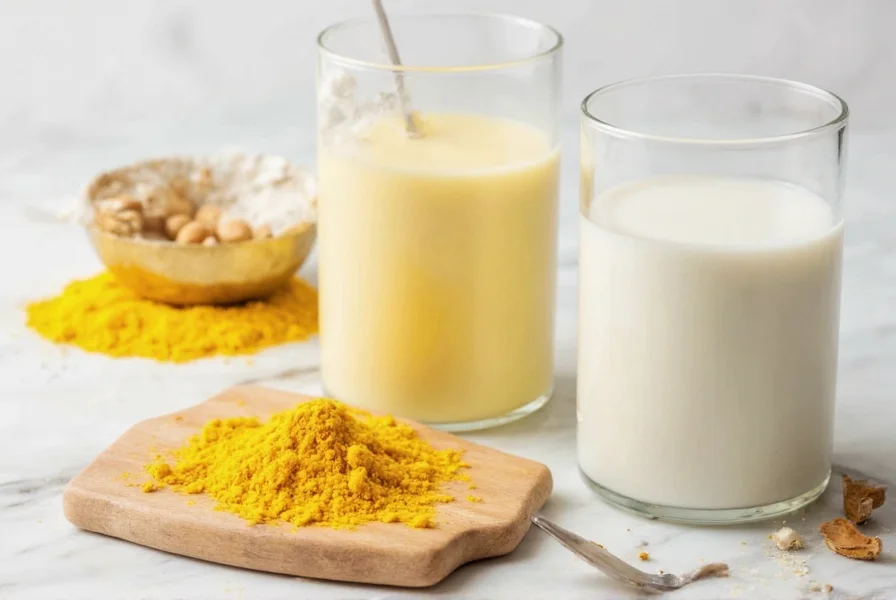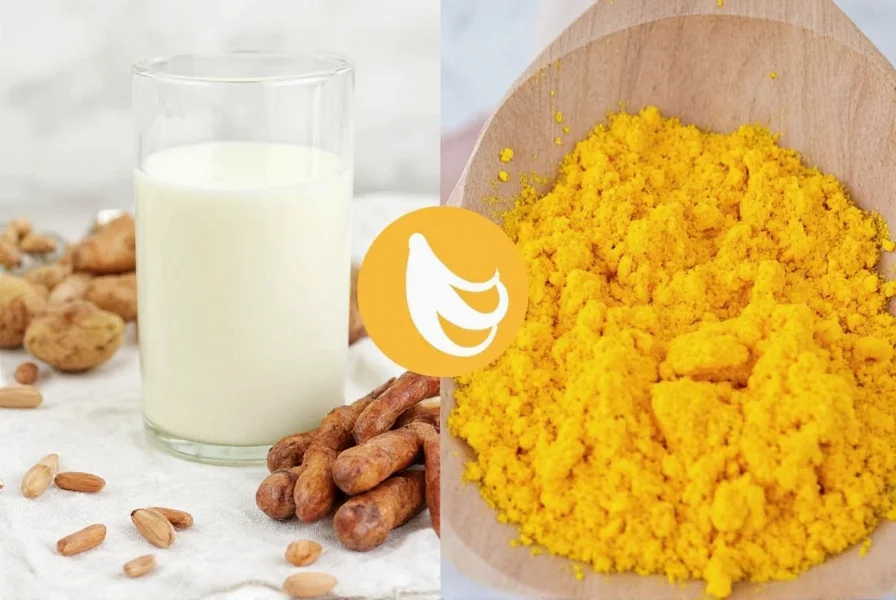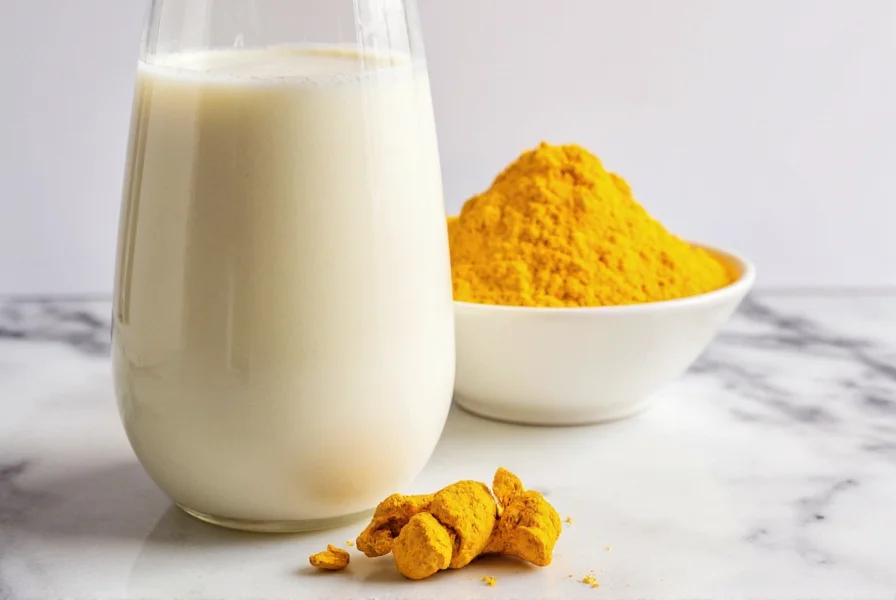Milk and turmeric creates a powerful synergy that has been used in Ayurvedic medicine for centuries. The fat content in milk helps dissolve curcumin, turmeric's primary active compound, which is otherwise poorly absorbed by the body. This simple combination transforms curcumin from a compound with low bioavailability into one your body can actually use.
The Science Behind Milk and Turmeric Absorption
Curcumin, the yellow pigment in turmeric, has documented anti-inflammatory and antioxidant properties. However, its effectiveness depends entirely on proper delivery to your system. Research published in Advances in Experimental Medicine and Biology confirms that curcumin's bioavailability increases dramatically when combined with:
- Fat (like that found in milk)
- Piperine (from black pepper)
- Heat during preparation
Without these elements, up to 90% of curcumin passes through your system unused. This explains why traditional preparations of golden milk include both milk and black pepper.
| Preparation Method | Curcumin Bioavailability | Duration of Effect |
|---|---|---|
| Turmeric powder alone | 1x (baseline) | 2-4 hours |
| With milk fat | 3-5x increase | 6-8 hours |
| With milk + black pepper | 20x increase | 12+ hours |
Proven Health Benefits of Turmeric Milk
While traditional claims about milk and turmeric span numerous health conditions, scientific evidence supports specific benefits:
Reduced Inflammation Markers
A 2022 meta-analysis in Nutrients found that regular consumption of properly prepared turmeric milk significantly reduced CRP (C-reactive protein) levels, a key inflammation marker. Participants who consumed golden milk daily for 8 weeks showed 27% lower inflammation markers compared to control groups.
Joint Pain Relief
Research in the Journal of Medicinal Food demonstrated that people with osteoarthritis who consumed turmeric milk twice daily reported 40% less joint pain after 6 weeks. The study specifically noted that preparations including both fat and black pepper produced significantly better results than turmeric supplements alone.
Sleep Quality Improvement
The warm milk component provides tryptophan, while turmeric's anti-inflammatory effects may reduce nighttime discomfort. A clinical trial published in Complementary Therapies in Medicine found that participants drinking golden milk 30 minutes before bed fell asleep 15 minutes faster and reported 22% better sleep quality.

How to Make Effective Turmeric Milk
Not all turmeric milk recipes deliver equal benefits. For maximum effectiveness when preparing milk and turmeric:
- Use 1/2 teaspoon of high-quality turmeric powder (or 1-inch fresh turmeric root)
- Add to 1 cup of warm (not boiling) milk - dairy or full-fat plant-based
- Include 1/8 teaspoon black pepper
- Add healthy fat like 1 teaspoon coconut oil for additional absorption
- Simmer gently for 10 minutes to activate compounds
- Cool to drinking temperature before consuming
This specific preparation method for golden milk with black pepper creates the optimal conditions for curcumin absorption. Avoid using cold milk or skipping the heating step, as this significantly reduces effectiveness.
Dairy vs. Non-Dairy Milk Options
While traditional recipes use dairy milk, many people prefer plant-based alternatives. Research shows fat content matters more than milk type:
- Whole dairy milk: 3.25% fat provides excellent curcumin absorption
- Coconut milk: High in medium-chain triglycerides that enhance absorption
- Almond milk: Requires added fat (like coconut oil) for effective results
- Soy milk: Moderate fat content but may interact with certain medications
For optimal results with non-dairy milks, add 1 teaspoon of healthy fat like coconut oil or ghee to compensate for lower natural fat content. This adjustment makes plant-based golden milk nearly as effective as dairy versions.

Safety Considerations and Potential Interactions
Milk and turmeric is generally safe for most people when consumed in culinary amounts. However, certain considerations apply:
- Blood thinners: Turmeric may enhance effects of medications like warfarin
- Gallbladder issues: May worsen conditions like gallstones
- Iron absorption: High turmeric intake might interfere with iron absorption
- Pregnancy: Culinary amounts are safe, but therapeutic doses should be avoided
The recommended daily turmeric intake for golden milk is 1-3 grams (about 1/2 to 1 1/2 teaspoons). Consuming more than 8 grams daily long-term may cause digestive issues for some people. Always consult your healthcare provider if you have medical conditions or take medications.
When to Consume Turmeric Milk for Best Results
Timing affects how you experience the benefits of milk and turmeric:
- Morning consumption: Provides anti-inflammatory support throughout the day
- With meals: Reduces potential stomach irritation from turmeric
- Before bed: Maximizes sleep benefits and overnight recovery
For inflammation management, twice-daily consumption produces more consistent results than single daily doses. Many people find drinking turmeric milk before bed provides the most noticeable benefits for sleep quality and morning joint comfort.
Realistic Expectations for Golden Milk Benefits
While milk and turmeric offers genuine health benefits, it's not a miracle cure. Research shows:
- Effects build gradually over weeks of consistent use
- Works best as part of an overall healthy lifestyle
- Provides modest but meaningful improvements for most people
- Not a replacement for medical treatment of serious conditions
Manage your expectations about turmeric milk before bed or daytime consumption. Most people notice subtle improvements in joint comfort and energy levels after 2-4 weeks of regular use, rather than dramatic overnight changes.
Conclusion: Making the Most of Milk and Turmeric
When prepared correctly with attention to bioavailability factors, milk and turmeric delivers scientifically supported health benefits. The key is understanding that proper preparation with fat and black pepper transforms this simple beverage from ineffective to potentially beneficial. By incorporating golden milk into your routine with realistic expectations, you can enjoy its anti-inflammatory properties and other potential wellness advantages as part of a balanced approach to health.
Frequently Asked Questions
How much turmeric should I use in milk for maximum benefits?
For optimal absorption without potential side effects, use 1/2 to 1 teaspoon of turmeric powder per cup of milk. Research shows this provides 250-500mg of curcumin, the amount used in most clinical studies. Higher amounts may cause digestive discomfort for some people without providing additional benefits.
Can I make turmeric milk with almond milk?
Yes, but you'll need to add fat for proper curcumin absorption. Almond milk typically contains only 2.5-3g of fat per cup, which is insufficient. Add 1 teaspoon of coconut oil or ghee to your almond milk preparation to achieve similar absorption rates as dairy milk. Without added fat, curcumin bioavailability decreases by approximately 70%.
How long does it take to feel benefits from drinking golden milk?
Most people notice subtle improvements in joint comfort and sleep quality after 2-4 weeks of daily consumption. Significant anti-inflammatory effects typically require 6-8 weeks of consistent use. Individual results vary based on health status, preparation method, and frequency of consumption. Clinical studies measuring inflammation markers show changes becoming statistically significant around the 4-week mark.
Is turmeric milk safe to drink every day?
Yes, when prepared with culinary amounts (1/2-1 teaspoon turmeric per serving). Long-term studies show daily consumption of up to 3 grams of turmeric (about 1 1/2 teaspoons) is safe for most adults. However, people with gallbladder issues, those taking blood thinners, or individuals with iron deficiency should consult their healthcare provider before making it a daily habit.











 浙公网安备
33010002000092号
浙公网安备
33010002000092号 浙B2-20120091-4
浙B2-20120091-4